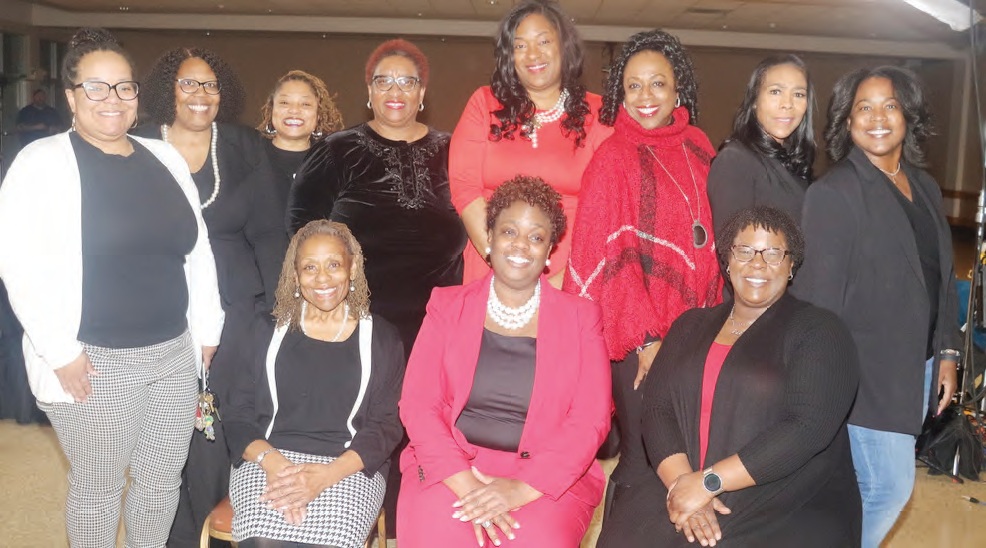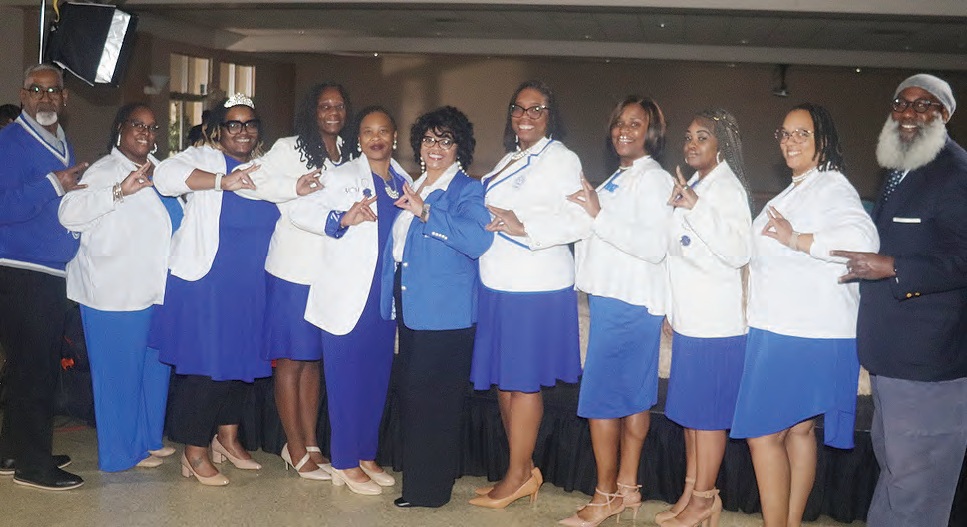PITTSBURGH MAYOR ED GAINEY BEING INTERVIEWED BY WPXI-TV ANCHOR LISA SYLVESTER, DURING THE NATIONAL PAN-HELLENIC COUNCIL OF PITTSBURGH MAYORAL FORUM, MARCH 27, AT NORTHSIDE INSTITUTIONAL CHURCH OF GOD. (PHOTO BY J.L. MARTELLO)
The struggle is real when it comes to living in Pittsburgh for African Americans.
Day after day, Pittsburgh’s Blacks dwindles, like the sand in an hourglass.
Pittsburgh’s first Black mayor, Ed Gainey, says he is not only “trying” to do something about it, he “has” done something about it. He says he’s secured 1,600 units of affordable housing in the city since he took office in January 2022. Those 1,600 units include new development along with preserved units.
Gainey’s Democratic challenger for mayor, Corey O’Connor, continues to dispute that number.
With the Primary Election scheduled for Tuesday, May 20, both O’Connor and Gainey know that affordable housing is a key sticking point for city voters.
“The 1600-plus units of affordable housing I’ve delivered during my time as mayor includes new homes, restored homes, homes for renters, and for first-time homebuyers —all priced affordably,” Mayor Gainey said in a statement to the Courier, April 23, after he took the public on a tour of what his campaign called affordable housing success stories within Pittsburgh earlier that morning. Those stops included: Pennley Commons and New Pennley Place, 5601 Penn Ave., East Liberty, where the two projects represent over 145 affordable rental units and 29 market-rate units preserved or currently under construction through the Urban Redevelopment Authority (URA) and Housing Authority of the City of Pittsburgh (HACP); the former Letsche School, 1530 Cliff St., Hill District, where 39 affordable and seven market-rate new rental units were completed through the URA and HACP; Ledlie St. Townhomes, 18 Ledlie St., Hill District, where two new 3-bedroom, 1.5 bathroom-townhomes are being constructed on formerly vacant, underutilized land; Bedford Dwellings, 1738 Reed St., Hill District, where the 411 units of the Bedford Dwellings public housing complex will be replaced and an additional 422 units of new rental housing across the current Bedford Dwellings location and three other locations in the Middle Hill District will be built; and the Mosaic Apartments, 3133 Forbes Ave., Oakland, where 48 units of LGBTQ-friendly senior housing will be constructed.
Mayor Gainey, in his statement, continued: “These are homes for the single moms and dads, hard-working parents trying to keep up with the cost of housing, for seniors on fixed incomes, folks working multiple jobs to stay afloat, young people and students getting their start, and social workers making $45,000 a year. Hundreds of these homes are completed, and hundreds more are under construction and will be available soon. They are homes on the North Side, Downtown, East Hills, Knoxville, Fairywood and too many more neighborhoods to name. These homes are already transforming the lives of regular Pittsburghers, and in my second term, I’ll finish the work I started making safe, stable, affordable housing a reality for all.”
Obtaining affordable housing is a complicated matter. In a city like Pittsburgh, where the steel mills have given way to eds, meds and tech, an influx of out-of-towners —primarily White—have moved and continue to move to Pittsburgh. Jobs are being secured at places like Google, the local universities, the local hospitals, and more. Salaries are good, causing real estate developers to flock to Pittsburgh and build new apartments that are priced at “market-rate.” In layman terms, “market-rate” means upwards of $1,500 for a one-bedroom apartment, some in the range of $1,700 or more. As an example, Eastside Bond —the apartments that sit next to the East Liberty Busway, across from Target, marketed a studio apartment at $1,863 a month on April 29. A two bedroom was marketed for $3,459 per month.
More mostly-market-rate housing is being built right now on Shakespeare Street, where the East Liberty Giant Eagle formerly stood. Not only is a new Giant Eagle being developed, but above it will be apartments, the price of which will be out of the range for most African Americans in Pittsburgh.
The current AMI, or Area Median Income, for Pittsburgh, is $64,137, according to the U.S. Census Bureau. “Market-rate” rents are being judged on that figure. “Affordable housing” usually refers to living situations for people whose individual income is no more than 50 percent of that AMI, which calculates to $32,068.
Most real estate developers want to go the market-rate route, which is why securing affordable housing units, especially new ones, require a great deal of negotiation and tax credits. Organizations like the URA, HACP and the Pennsylvania Housing Finance Agency have to get involved to make things sweet for the developer.
Mayor Gainey has been “put through the ringer” about his affordable housing numbers. O’Connor claims Gainey has only built or preserved “a few hundred” affordable housing units, and other local media outlets have tried to determine via their research how many affordable housing units actually have been preserved or built.
However, Gainey’s stance is firm, and during a press conference on Monday, April 28, at Freedom Corner in the Hill District, the mayor had 50 people, Whites and Blacks alike, supporting his affordable housing numbers and his re-election bid. The Pittsburgh Federation of Teachers officially endorsed him during the press conference, as did the SEIU Local 668, City Councilmen Khari Mosley and R. Daniel Lavelle, and the organization One PA. Local state representatives La’Tasha D. Mayes and Aerion Abney, along with Pittsburgh School Board Directors Devon Taliaferro and Sylvia Wilson, Alliance for Police Accountability CEO Brandi Fisher and Congresswoman Summer Lee had already endorsed Gainey.
“Under Mayor Gainey, we don’t just talk about change,” Councilman Lavelle said at the press conference. “He makes it happen.”

THE WOMEN OF ALPHA KAPPA ALPHA SORORITY INC., AT THE NATIONAL PAN-HELLENIC COUNCIL OF PITTSBURGH MAYORAL FORUM, MARCH 27, ON THE NORTH SIDE. (PHOTO BY J.L. MARTELLO)

THE MEN OF IOTA PHI THETA FRATERNITY INC.

THE WOMEN OF DELTA SIGMA THETA SORORITY INC. (PHOTO BY J.L. MARTELLO)

THE MEN OF PHI BETA SIGMA FRATERNITY INC., AND THE WOMEN OF ZETA PHI BETA SORORITY INC. (PHOTO BY J.L. MARTELLO)